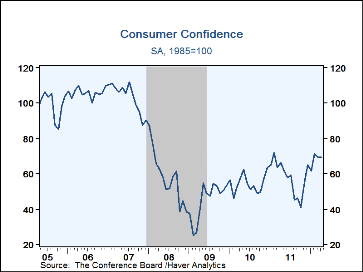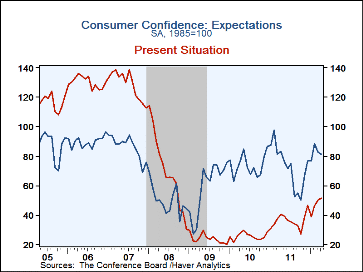 Global| Apr 24 2012
Global| Apr 24 2012U.S. Consumer Confidence Declines Slightly
by:Tom Moeller
|in:Economy in Brief
Summary
The Conference Board's Index of Consumer Confidence during April slipped to 69.2 from 69.5 last month, initially reported as 70.2. Nevertheless, the latest two figures were the highest since February 2011 and were up nearly three- [...]
 The Conference Board's Index of Consumer Confidence during April
slipped to 69.2 from 69.5 last month, initially reported as 70.2.
Nevertheless, the latest two figures were the highest since February 2011
and were up nearly three-quarters from the October low. The April number
fell slightly short of Consensus estimates for 70.0. During the last ten
years there was been a 48% correlation between the level of confidence and
the three-month change in real PCE.
The Conference Board's Index of Consumer Confidence during April
slipped to 69.2 from 69.5 last month, initially reported as 70.2.
Nevertheless, the latest two figures were the highest since February 2011
and were up nearly three-quarters from the October low. The April number
fell slightly short of Consensus estimates for 70.0. During the last ten
years there was been a 48% correlation between the level of confidence and
the three-month change in real PCE.
The slip in overall confidence owed to a lower expectations component which edged down m/m to 81.1, although it was nearly its highest level in a year. The percentage expecting business conditions to improve fell to 18.8%. Expectations for more jobs slipped m/m but remained sharply higher than the September low. Down m/m, income expectations also have improved sharply versus the recession low.
The present situation reading improved to 51.4 from a downwardly-revised March level. Fewer respondents saw jobs as being plentiful and there also was a decline in the "jobs hard to get" reading. An improved 15.3% of respondents thought business conditions were good and the percentage of respondents indicating that conditions were bad was 33.5% versus 51.0% at the recession peak.
Expectations for inflation in the next twelve months fell back m/m to 5.8% from 6.2% in March. The percentage of people looking for stock prices to rise increased to 35.7% this month, the most optimistic since February of last year, while the percent who are bearish fell to 29.1%, the least negative since February 2011. The percentage expecting higher interest rates rose to 48.8%
Headline figures on consumer confidence are carried in Haver's USECON database. The Conference Board's detailed data are found in Haver's CBDB database, and the consensus expectations figure is from Actions Economics, as tabulated in the AS1REPNA database.
| Conference Board (SA, 1985=100) | Apr | Mar | Feb | Y/Y % | 2011 | 2010 | 2009 |
|---|---|---|---|---|---|---|---|
| Consumer Confidence Index | 69.2 | 69.5 | 71.6 | 4.8 | 58.1 | 54.5 | 45.2 |
| Present Situation | 51.4 | 49.9 | 46.4 | 27.9 | 36.2 | 25.7 | 24.0 |
| Expectations | 81.1 | 82.5 | 88.4 | -2.5 | 72.8 | 73.7 | 59.3 |
Tom Moeller
AuthorMore in Author Profile »Prior to joining Haver Analytics in 2000, Mr. Moeller worked as the Economist at Chancellor Capital Management from 1985 to 1999. There, he developed comprehensive economic forecasts and interpreted economic data for equity and fixed income portfolio managers. Also at Chancellor, Mr. Moeller worked as an equity analyst and was responsible for researching and rating companies in the economically sensitive automobile and housing industries for investment in Chancellor’s equity portfolio. Prior to joining Chancellor, Mr. Moeller was an Economist at Citibank from 1979 to 1984. He also analyzed pricing behavior in the metals industry for the Council on Wage and Price Stability in Washington, D.C. In 1999, Mr. Moeller received the award for most accurate forecast from the Forecasters' Club of New York. From 1990 to 1992 he was President of the New York Association for Business Economists. Mr. Moeller earned an M.B.A. in Finance from Fordham University, where he graduated in 1987. He holds a Bachelor of Arts in Economics from George Washington University.








